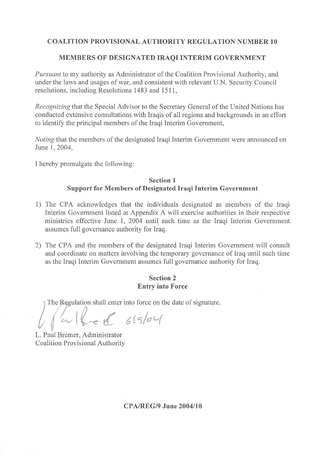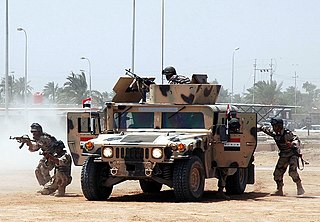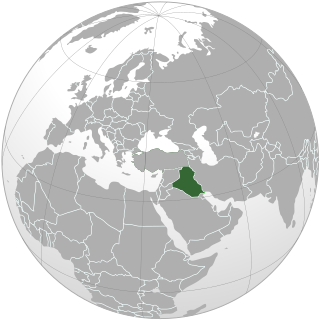
United Nations Security Council resolution 1546, adopted unanimously on 8 June 2004, after reaffirming previous resolutions on Iraq, the Council endorsed the formation of the Iraqi Interim Government, welcomed the end of the occupation and determined the status of the multinational force and its relationship with the Iraqi government.

United Nations Security Council Resolution 1723, adopted unanimously on November 28, 2006, after recalling previous resolutions on Iraq, the Council extended the mandate of the multinational force until the end of 2007.

The United Nations Assistance Mission for Iraq (UNAMI) was formed on 14 August 2003 by United Nations Security Council (UNSC) Resolution 1500 at the request of the Iraqi government to support national development efforts.

United Nations Security Council Resolution 1936, adopted unanimously on August 5, 2010, after recalling all previous resolutions on the situation in Iraq, including resolutions 1500 (2003), 1546 (2004), 1557 (2004), 1619 (2005), 1700 (2006), 1770 (2007), 1830 (2008) and 1883 (2009), the Council extended the mandate of the United Nations Assistance Mission in Iraq (UNAMI) for a further period of 12 months, until July 31, 2011.

United Nations Security Council resolution 1471, adopted unanimously on 28 March 2003, after reaffirming all resolutions on the situation in Afghanistan, the Council extended the mandate of the United Nations Assistance Mission in Afghanistan (UNAMA) for an additional period of twelve months until 28 March 2004.

United Nations Security Council resolution 1500, adopted on 14 August 2003, after reaffirming previous resolutions on Iraq, particularly Resolution 1483 (2003), the council established the United Nations Assistance Mission in Iraq (UNAMI) and welcomed the creation of the Iraqi Governing Council.

United Nations Security Council resolution 1557, adopted unanimously on 12 August 2004, after reaffirming previous resolutions on Iraq, particularly resolutions 1500 (2003) and 1546 (2004), the Council extended the mandate of the United Nations Assistance Mission in Iraq (UNAMI) for a further period of twelve months. The resolution was drafted by the United Kingdom and United States.

United Nations Security Council resolution 1589, adopted unanimously on 24 March 2005, after reaffirming all resolutions on the situation in Afghanistan, particularly Resolution 1536 (2004), the council extended the mandate of the United Nations Assistance Mission in Afghanistan (UNAMA) for an additional period of twelve months until 24 March 2006.

United Nations Security Council Resolution 1609 was adopted unanimously on 24 June 2005. After recalling previous resolutions on the situation in Côte d'Ivoire, the council extended the mandate of the United Nations Operation in Côte d'Ivoire (UNOCI) and supporting French forces for a further seven months until 24 January 2006.

United Nations Security Council resolution 1619, adopted unanimously on 11 August 2005, after reaffirming previous resolutions on Iraq, particularly resolutions 1500 (2003), 1546 (2004) and 1557 (2004), the Council extended the mandate of the United Nations Assistance Mission in Iraq (UNAMI) for a further period of twelve months.

United Nations Security Council resolution 1623, adopted unanimously on 13 September 2005, after reaffirming all resolutions on the situation in Afghanistan, particularly resolutions 1386 (2001), 1413 (2002), 1444 (2002), 1510 (2003) and 1563 (2004), and resolutions 1368 (2001) and 1373 (2001) on terrorism, the council extended the authorisation of the International Security Assistance Force (ISAF) until mid-October 2006.

United Nations Security Council Resolution 1662, adopted unanimously on March 23, 2006, after reaffirming all resolutions on the situation in Afghanistan, including resolutions 1589 (2005) and 1659 (2006), the Council extended the mandate of the United Nations Assistance Mission in Afghanistan (UNAMA) for an additional period of twelve months.

United Nations Security Council Resolution 1681, adopted unanimously on May 31, 2006, after reaffirming all resolutions on the situation between Eritrea and Ethiopia, particularly resolutions 1320 (2000), 1430 (2003), 1466 (2003), 1640 (2005) and 1678 (2006), the Council extended the mandate of the United Nations Mission in Ethiopia and Eritrea (UNMEE) until September 30, 2006, and cut its size by a third.

United Nations Security Council Resolution 1690, adopted unanimously on June 20, 2006, after reaffirming previous resolutions on East Timor (Timor-Leste), particularly resolutions 1599 (2005) and 1677 (2006), the Council renewed the mandate of the United Nations Office in Timor-Leste (UNOTIL) for two months until August 20, 2006.

United Nations Security Council Resolution 2001, adopted unanimously on July 28, 2011, after recalling all previous resolutions on the situation in Iraq, including resolutions 1500 (2003), 1546 (2004), 1557 (2004), 1619 (2005), 1700 (2006), 1770 (2007), 1830 (2008), 1883 (2009) and 1936 (2010), the Council extended the mandate of the United Nations Assistance Mission in Iraq (UNAMI) for a further period of 1 year.

The United Nations Support Mission in Libya (UNSMIL) is a United Nations (UN) advanced mission in Libya, created in the aftermath of the Libyan Civil War. UNSMIL is a political mission, not a military mission. The main elements of its mandate defined by the UN include supporting Libyan transitional authorities in "post-conflict efforts", providing mediation in implementing Libyan political agreements, supporting key Libyan institutions and monitoring and reporting on human rights. UNSMIL is led by the UN Department of Political Affairs.

United Nations Security Council Resolution 1830 was unanimously adopted on 7 August 2008.
United Nations Security Council Resolution 1770 was unanimously adopted on 10 August 2007.

United Nations Security Council Resolution 1883 was unanimously adopted on 7 August 2009.

United Nations Security Council Resolution 2110 is a United Nations Security Council resolution adopted unanimously by the United Nations Security Council on 24 July 2013, extending the United Nations Assistance Mission for Iraq until 31 July 2014 as stipulated in several previous resolutions The resolution signaled its intention to review the original mandate, as stipulated in UNSC resolution 2061 within twelve months.

















